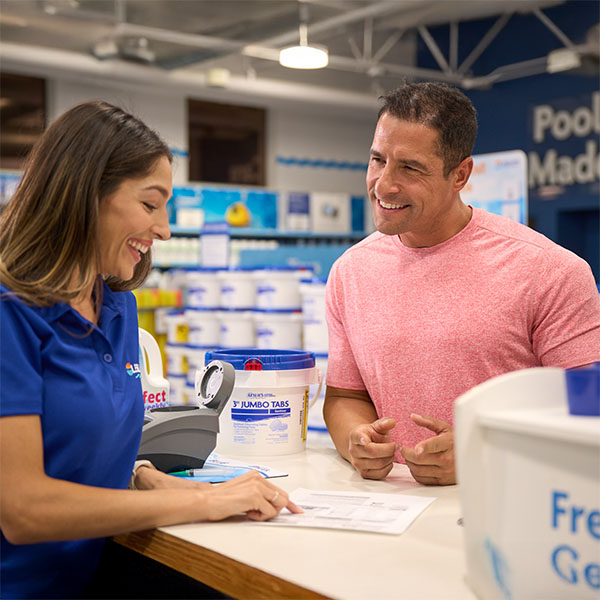As a pool owner, you know how wonderful it is to have sparkling, clean, healthy water. But keeping your pool water safe, balanced, and inviting requires consistent care—and one of the most important steps is regular water testing.
So, how often should you test your pool water? The answer depends on several key factors, including swimmer activity, water temperature, and especially the weather. In this guide, we’ll break down the ideal pool water testing schedule, explain why it matters, and share expert tips to help you maintain a clean, safe and beautiful pool all year long.
Why Is Pool Water Testing Important?

Testing your pool water isn’t just about aesthetics—it’s essential for:
- Maintaining proper water chemistry balance
- Preventing algae growth and cloudy water
- Protecting pool equipment and surfaces
- Ensuring swimmer safety and comfort
How Often Should You Test Your Pool Water?
Here’s a general guideline for pool water testing frequency:
- Daily: Test chlorine and pH levels, especially during peak swimming season.
- Weekly: Check total alkalinity, calcium hardness, and stabilizer (cyanuric acid).
- Monthly: Test for metals (like copper and iron) and total dissolved solids (TDS).
- After heavy rain, pool parties, or chemical adjustments: Always retest to ensure balance.
PRO TIP: Use a reliable pool water test kit or digital tester for accurate results. Leslie’s offers advanced pool testing with AccuBlue® technology from the convenience of your own home with AccuBlue Home® or with our FREE in-store test.
Factors That Affect Testing Frequency
Your pool’s needs may vary based on:
- Usage: More swimmers = more contaminants.
- Weather: Heat and sunlight can deplete chlorine levels.
- Pool type: Saltwater pools may require different testing intervals.
- Location: Dust, pollen, and debris can impact water quality—especially in dry climates.
Benefits of Regular Pool Water Testing
Just like maintaining your home, regular pool maintenance is essential to protect your investment and ensure long-term enjoyment. One of the most critical aspects of pool care is frequent water testing.
Routine water testing helps:
- Improve water clarity and health
- Prevent algae and cloudy water
- Reduce chemical costs through early detection
- Increase the lifespan for pool equipment
- Provide peace of mind for you and your guests
Neglecting water testing can lead to imbalanced chemicals, which may cause skin irritation, equipment damage, and expensive repairs.
PRO TIP: Test your pool water at least 2–3 times per week during peak swimming season, and after heavy rain, pool parties, or chemical adjustments.

Ideal Pool Water Chemistry Levels
Unsure where your water chemistry levels should be? The following are the ideal testing ranges:
- Chlorine: 1.0–4.0 ppm
- pH: 7.4-7.6
- Total Alkalinity: 80–120 ppm
- Calcium Hardness: 200–400 ppm
- Cyanuric Acid: 30–50 ppm
Tools for Accurate Pool Water Testing
- Pool test strips: Quick and easy for routine checks
- Leslie’s Water Test Kits: More precise for detailed analysis
- Digital Pool Water Testers: Ideal for tech-savvy pool owners
- Leslie’s AccuBlue®: Fast, accurate, in-store results at Leslie’s. Test results are easy to track in the Leslie’s app for both iPhone and Android Devices.
- AccuBlue Home® – Reliable testing results in the comfort of your home. Test results appear in the Leslie’s app with a personalized water testing prescription.
For even better understanding of comprehensive pool chemistry, check out our article on Pool Chemistry 101.
Pool Water Testing Frequency: Cold vs. Warm Weather
Maintaining balanced pool water is essential year-round, but your pool water testing frequency should shift with the seasons. Whether you’re dealing with chilly winter temperatures or the heat of summer, understanding how weather affects your pool chemistry can help you avoid damage, reduce costs, and keep your water safe and clean.
Testing Frequency in Warm Temperatures
As temperatures rise and pool activity increases, so does the need for frequent water testing. Warm weather accelerates chlorine breakdown and introduces more contaminants from swimmers, pets, and the environment.
Here’s your warm-weather testing schedule:
- Above 70ºF: Test water at least once a week
- Peak summer (80ºF+): Test twice a week or more
- High-use pools: Consider daily chlorine testing
- After heavy rain or storms: Always test to rebalance water chemistry
BONUS TIP: Not sure which testing method is best for your pool? Explore your options in our comprehensive guide: AccuBlue and Water Testing FAQs!
Testing Frequency in Cold Temperatures
During the cooler months, pool usage typically drops—and so does the demand for chlorine. However, over-chlorination can become a problem if you’re not careful, potentially damaging pool covers, liners, and equipment.
Here’s a seasonal testing guide for cold weather:
- Below 65ºF: Test chlorine levels every two weeks
- Below 60ºF: Test chlorine levels monthly
- After contamination events (rain, excessive leaves, pollen, or storms): Test immediately
WINTER PRO TIP: If your pool is closed for the season, focus only on monitoring chlorine levels. Without a running pump, you won’t be able to balance other chemicals.
Frozen Pool? No Problem—Just Wait for Spring
If your pool is frozen, there’s no need to test the water or attempt maintenance right away. To avoid costly damage:
- Do not break the ice with tools
- Do not run equipment if the pipes are frozen
- Do not pour hot water on the ice
- Do not walk on the ice
Instead, follow these safe steps:
- Turn off power to prevent equipment damage
- Let the ice melt naturally
- Inspect plumbing for cracks or damage once the thaw is complete
Seasonal changes play a major role in your pool’s chemical balance. By adjusting your pool water testing frequency based on temperature and usage, you’ll protect your pool, reduce maintenance costs, and enjoy a safer swimming experience.
Top Benefits of Regular Pool Water Testing
Maintaining balanced water chemistry is one of the most important aspects of swimming pool care. Yet many pool owners underestimate the value of regular pool water testing. By monitoring your pool’s chemical levels consistently, you can prevent damage, extend the life of your pool, and save money in the long run.
Prevents Pool Damage
Unbalanced water can wreak havoc on your pool’s surfaces and equipment:
- High pH levels lead to calcium scale buildup on walls, floors, filters, pumps, and plumbing.
- Low pH levels create corrosive water that deteriorates heaters, lights, ladders, handrails, and filtration systems.
By testing your pool’s pH levels regularly, you can catch these issues early and maintain a safe, balanced environment.
Extends the Life of the Pool

Your swimming pool is a major investment—and regular water testing helps protect it. Long-term exposure to corrosive or scaling water can cause irreversible damage to your pool system. Monitoring the following key chemical levels ensures your pool stays in top condition for years to come:
- pH
- Chlorine
- Total Alkalinity
- Calcium Hardness
Saves Money
Think of pool water testing like routine car maintenance. Small, consistent checkups can prevent major breakdowns later. Even if your pool looks fine on the surface, imbalanced water can silently corrode equipment and lead to expensive repairs.
Regular testing helps you:
- Avoid emergency service calls
- Reduce chemical waste
- Prolong the life of pumps, filters, and heaters
Regular pool water testing isn’t just a chore—it’s a smart strategy to protect your investment, ensure swimmer safety, and enjoy crystal-clear water all season long. Make it part of your weekly routine and reap the benefits for years to come.
Get Your Water Professionally Tested Once a Month

If you’re not into the DIY scene or prefer to leave the precision of water testing to the pros, we’ve got you covered.
Consider taking your water to your local Leslie’s for the most advanced, comprehensive, and precise water testing experience available. Our in-store AccuBlue® water testing service is completely free and available at all Leslie’s locations. Simply bring us a sample of your pool water, and our friendly and knowledgeable team will test for important parameters such as pH, chlorine, alkalinity, calcium hardness, and more, ensuring every aspect of your pool’s chemistry is balanced. Based on the results, you’ll receive a step-by-step customized water treatment plan, making sure your pool water remains pristine, secure, and gorgeous.
Why Monthly Professional Testing Matters
Even if you test your pool water at home regularly, professional testing offers:
- Greater accuracy with advanced equipment
- Detailed insights into water chemistry beyond basic pH and chlorine
- Personalized recommendations for chemical adjustments
- Peace of mind knowing your pool is safe and well-maintained
Save Time, Money, and Stress
Routine testing helps you:
- Avoid overuse of chemicals
- Prevent costly equipment damage
- Reduce time spent on troubleshooting water issues
- Catch imbalances early before they become major problems
Whether you test at home or rely on professionals, consistency is key. A regular testing schedule helps you stay ahead of potential issues and keeps your pool water safe, clear, and enjoyable all season long.







